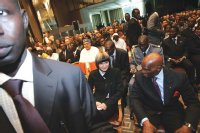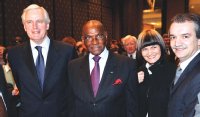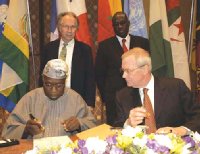
| Home : ITU News magazine | |||||||||
President Olusegun Obasanjo of Nigeria inaugurated the Fund in his capacity as Chairman of the African Union at the ceremony he chaired with Guy-Olivier Segond (Switzerland), President of the Global Digital Solidarity Fund. President Obasanjo called for a collective effort to dismantle existing obstacles to empowering poor communities and nations. This includes checking prohibitive pricing of technology and technology products and expanding access to training. He deplored the digital divide: “It is unacceptable that though the developed world has only 15 per cent of the world’s population, it controls more than 75 per cent of Internet users. In spite of the efforts of developing country governments, most school children have never had access to manual typewriters, and much less to modern ICT infrastructure now critical to development and learning.” Micheline Calmy-Rey, Federal Councillor, Department of Foreign Affairs of the Swiss Confederation, also decried the alarming gap. Ms Calmy-Rey said that more than 80 per cent of the world’s population had no access to information technology. She added that the digital divide does not only exist between poor and rich countries. It also exists in the developed world between cities and villages, between men and women, and between the young and the elderly. She stressed the importance of giving women, who make up the majority of the world’s population, a true place in an information society that is so predominantly male. President Abdoulaye Wade of Senegal, Founding Father of the Digital Solidarity Fund, said that in Africa there is, on average, one computer for every 5000 inhabitants. He praised the Fund as a decisive step to boost the development of ICT in the developing world. Transparency and efficiency will be the watchwords for the smooth operation of the Fund, he said. Margarita Cedeño de Fernández, the First Lady of the Dominican Republic, reaffirmed her country’s support for the Fund, highlighting Government efforts to close the digital divide. The Office of the First Lady has been appointed to implement a number of projects in this Caribbean country of 8.6 million inhabitants. More than 3 million of these people are without access to technologies, and are excluded from the development process and the potential benefits that globalization could offer. “We have developed a comprehensive and very ambitious plan to install 135 Community Technology Centers, one in each municipality throughout the country, so that those extremely poor communities have the opportunity to be a part of the development process,” the First Lady said. She cited the thoughts of the renowned French author Victor Hugo for all to reflect upon: “The future has many names. For the weak, it is unachievable. For the fearful, it is unknown. For the courageous it is an opportunity.” Other speakers at the ceremony were President Abdelaziz Bouteflika of the People’s Democratic Republic of Algeria; President Teodoro Obiang Nguema Mbasogo of the Republic of Equatorial Guinea; Michel Barnier, Minister for Foreign Affairs of France; Mohamed Benaïssa, Minister of Foreign Affairs and Cooperation of the Kingdom of Morocco; Christian Ferrazino, Vice-Mayor of the city of Geneva and Spokesperson for the Global Digital Solidarity Fund; Gérard Collomb Senator Mayor of Lyon, representing the United Cities and Local Governments; and Pierre Muller, Mayor of the city of Geneva. New contributions to the FundPresident Obasanjo donated EUR 500 000 and pledged administrative and technical support for the Fund’s projects. President Bouteflika announced a contribution of USD 500 000, adding that his country was joining the Global Digital Solidarity Fund as a founding member. Mr Benaïssa, representing His Majesty King Mohammed VI of Morocco, announced the Monarch’s decision for the Kingdom to become a founding member of the Fund and pledged EUR 300 000. Mr Barnier reiterated the French Government’s support for this “ fair and brilliant” idea of solidarity and donated EUR 300 000 from France. President Nguema Mbasogo of Equatorial Guinea pledged EUR 300 000. An idea whose time has come
When the idea of a voluntary Digital Solidarity Fund was first mooted, it sparked much controversy. Backers of the Fund wanted it adopted as a new way to help countries that are technologically disadvantaged to improve or build infrastructure in a bid to narrow the digital gap between developed and developing countries. Sceptics expressed their misgivings. In the end, the lack of consensus led the Geneva phase of the Summit to request the United Nations Secretary-General to set up a task force to study existing and new financing mechanisms, including the proposed voluntary Digital Solidarity Fund, and report back to the second phase of the Summit in Tunis in November 2005. However, the prime movers of the Digital Solidarity Fund could not see this idea put on hold until Tunis 2005. For them, mere declarations of intent were simply, not good enough.“ I saw many parties become involved in lengthy discussions over the idea of a new fund for ICT development,” Mr Utsumi recalled. “They even created a task force to investigate the existing funds. But, in the meantime, the organizers of the Digital Solidarity Fund had already taken concrete steps. Truly, actions did speak louder than words,” he told participants. Indeed, on the final day of WSIS (12 December 2003), the mayors of Geneva and the French city of Lyon, the President of the Province of Turin (Italy) and President Wade of Senegal formed a committee and created the Digital Solidarity Fund. The city of Geneva donated USD 395 000 and Lyon donated 368 000 to the proposed Fund, with Senegal contributing USD 500 000, bringing the total to EUR 1 million. By this time, the idea of creating the Fund had already received the support of a number of municipalities and regional governments at the World Summit of Cities and Local Authorities on the Information Society (Lyon, 4–5 December 2003). President Wade initially proposed the concept of “digital solidarity” to a WSIS Preparatory Committee meeting in February 2003 in his capacity as coordinator of ICT matters within the New Partnership for Africa’s Development (NEPAD). Special tribute was paid to President Wade for championing the cause of the South in the emerging information society. For many participants in the inaugural ceremony, he has been a solid pillar for promoting special financial mechanisms designed to enable developing countries, especially the low-income ones, to join the information society. The Geneva PrincipleThe Digital Solidarity Fund is sustained through the voluntary commitment of public authorities and/or private entities that decide to implement a new financing mechanism for development known as the “Geneva Principle”. This principle involves a 1 per cent contribution on public ICT procurement contracts. On 1 January 2005, the city of Geneva adopted (and is already applying) the Geneva Principle, according to which public authorities commit to include “a digital solidarity clause” in all their calls for bids pertaining to the purchase of ICT equipment and services. This digital solidarity clause requires the company that wins the bid to contribute 1 per cent of the total amount of the transaction, paid on its profit margin, to the Digital Solidarity Fund. This 1 per cent contribution gives the right to use the “Digital Solidarity Fund” label.
|
|||||||||



